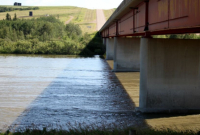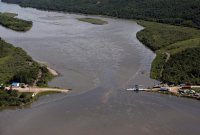Support strong Canadian climate journalism for 2025
Husky Energy was fined $3.8 million Wednesday for a pipeline oil leak that fouled a major river, harmed fish and wildlife and tainted the drinking water supply for thousands of people in Saskatchewan.
"We recognize that the spill had a significant impact on communities along the North Saskatchewan River and we're deeply sorry for that," Duane Rae, the company's vice-president of pipelines, said outside court in Lloydminster, Sask.
"We've been working hard since that day to try to set things right."
The spill into the North Saskatchewan River in July 2016 forced the cities of North Battleford, Prince Albert and Melfort to shut off their water intakes for almost two months.
Calgary-based Husky pleaded guilty to three environmental charges: two under federal migratory birds and fisheries legislation and one under a provincial law for releasing a harmful substance.
The federal Crown withdrew seven other charges.
About 225,000 litres of diluted heavy oil spilled from Husky's pipeline near Maidstone in west-central Saskatchewan. The company said about 40 per cent made it into the river and more than 90 per cent of the oil was recovered.
Provincial court Judge Lorna Dyck accepted a joint recommendation from lawyers on an amount for the fine.
"This case has been a difficult and a challenging one for a number of reasons," she said in her decision.
She noted that two alarms had gone off but were not recorded or reported to senior staff.
"Once the leak was discovered, Husky acted quickly and properly," said the judge. "I believe Husky has learned from this mistake."
"There's no doubt it has had a detrimental affect on Husky's reputation and on the industry as a whole," said Rae. "We have expended a lot of money on the cleanup — over $140 million."
A victim impact statement filed by three Indigenous communities in the area said the cleanup wasn't good enough. Chief Wayne Semaganis spoke on behalf of his Little Pine First Nation and also for the Sweetgrass and Red Pheasant bands.
He said birds, wildlife and fish still suffer the effects of the contamination and the First Nations have lost traditional use of their land.
"We no longer fish in the river. We no longer trap on or near reserve lands. We no longer farm on or near reserve lands," he said. "We no longer drink water drawn from reserve lands."
Semaganis said the Indigenous communities remain anxious, fearful and psychologically stressed.
The cities of North Battleford and Prince Albert also filed victim impact statements that were read out by the Crown.
"The impact was dire, ongoing and will cause long-lasting changes to procedures and processes," said the statement from North Battleford's city manager James Puffalt.
Prince Albert's statement said the spill caused significant disruption and stress for residents and had considerable costs.
Spray parks were closed at the peak of the summer holidays. Laundromats were shut down. Car washes couldn't operate and businesses had to close.
"The city was forced to implement its emergency operations centre," said the statement.
The city also had to lay temporary lines to two nearby rivers for drinking water.
Saskatchewan prosecutor Matthew Miazga told court there has never been an environmental event as significant in the province.
"Literally tens of thousands of people downstream were impacted."
Environment Canada investigator Jeff Puetz said staff put their full effort into getting information.
"We did search warrants and gathered tens of thousands of copies of documents from Husky in order to get enough evidence," he said.
The company said the pipeline buckled and leaked because of ground movement.
The line was allowed to reopen in October 2016 after being repaired and inspected.
Husky CEO Rob Peabody noted in a release that the oil and gas producer has been doing business in the Lloydminster region for more than 70 years.
“We understand that some people think we could have done better. After having such a long and successful history in this region, the event three years ago was a disappointment for all of us."
He added that the company has made improvements that include an updated leak response protocol, regular geotechnical reviews of pipelines and fibre optic sensing technology.





Comments
Deeply sorry? Yes, no doubt, this disaster couldn't have happened at a more fraught time in the reign of Oil/Gas supremacy. Before there were threats to our planet from fossil fuel burning, there were known threats from the seepage of oil/gas that were visible on the surface. Millenia of humans knew enough to avoid the evil places of poison. So much wisdom lost, so much harm done from wilful ignorance. Humanity seems to slip from one crisis of ignorance to another. Have we run out of our allowable margin of mistakes?
"We're deeply sorry" is misleading. Husky has no soul, they are just unhappy that their gambling lost them $3.8 M. What's one river to an industry killing the planet? To a psychopath, "sorry" is a magic word that can get them out of trouble, with no other meaning.
What will "Deeply Sorry" mean when at some point in the future a million barrels of this same stuff catches fire and burns on the West Coast of Canada or as we here like to call home British Columbia. A tanker full is a whole lot more damaging in the ocean then this reported spill. We "environmentalists" keep voicing our concerns but the Federal Government appears to be on it's way to increasing this danger by a huge increase in tanker traffic. In spite of this spill and the damaging result Saskatchewan remains totally in support of increasing pipelines to the coast. This is puzzling to me. There must be something in the water there... oh... there is!